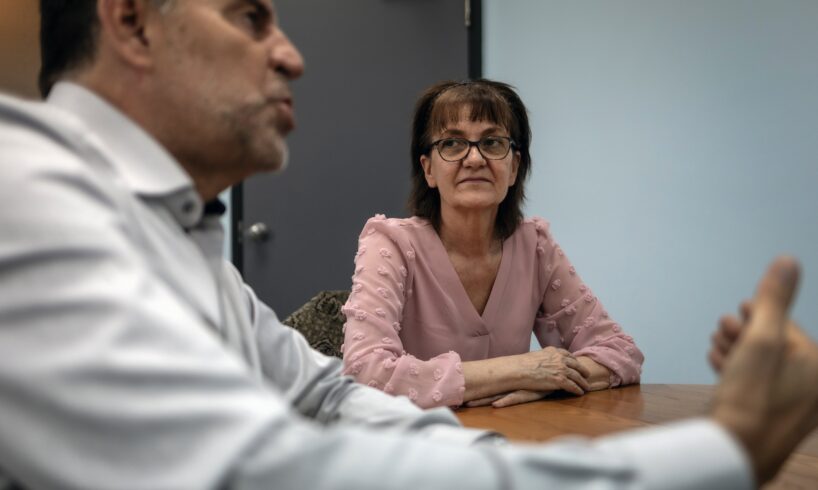
Open this photo in gallery:
Martine Riopel fought to keep the emergency room in Rivière-Rouge, Que., open because her cancer therapy made her more vulnerable to infections.ROGER LEMOYNE
After her breast cancer was detected in the fall of 2023, Martine Riopel’s weekly routine started every Monday morning with a visit to her local hospital in rural Quebec for blood tests. Then, she and other patients chatted while they waited for their physicians at the oncology ward.
It was during one of those chats that she heard about the hospital’s plans to close its emergency department in the evenings. “People were stressing about it and it stressed me, too,” she recalled. “I said to myself, ‘No way.’”
The 63-year-old maintenance worker contacted municipal councillors in her small town who were looking for a patient to be a plaintiff in a bid for a court injunction.
What happened next was a rare instance amid all the cases of ER closing throughout rural Canada. Ms. Riopel and the people of Rivière-Rouge, 180 kilometres northwest of Montreal, stopped the impending ER disruption.
Canadian ERs closed their doors for at least 1.14 million hours since 2019, records show
“It was David against Goliath. The government of Quebec against a small population of 5,000,” former town councillor Denis Charette said.
Like many rural facilities, the Rivière-Rouge hospital was chronically short-staffed and officials thought it would be better to close the ER at night than risk burning out the personnel.
As part of an investigation into ER closings, The Globe and Mail has compiled data on service disruptions since 2019. The Globe’s analysis found that at least 34 per cent of emergency departments in Canada had an unplanned shutdown in the past five years.
Rivière-Rouge’s local health authority, known as CISSS des Laurentides, never closed their ERs but they were frequently strained, as indicated by periodic appeals to the public to use them only for urgent problems.
Late in the fall of 2023, local mayors were told in a briefing that the Rivière-Rouge ER would close at night.
Mr. Charette said municipal councillors started talking about a judicial challenge.
At the end of January, a Quebec Superior Court judge rejected the first request bid by the town and locals for an injunction to stop the ER shutdown.
But on Feb. 1, just hours before the emergency department would lock its doors in the evening for the first time, Ms. Riopel was granted leave to appeal.
In an interview, the plaintiffs’ lawyer, Carl-Éric Therrien, said courts tend to give the benefit of the doubt to institutions that claim to act in the public interest. In his appeal, he had to revert that perception.
In small towns plagued by ER closures, virtual emergency care helps keep the doors open
He bolstered his arguments with testimonies from doctors, nurses and Ms. Riopel. Mr. Therrien told the judges that curbing the ER operations could have an irreversible impact if staff dispersed to find new jobs elsewhere.
Ms. Riopel explained that she needed an ER nearby because her cancer therapy made her more vulnerable to infections. She was under doctor’s orders to get checked at an emergency as soon as she had a fever. “I can’t take Tylenol or similar medications because it would mask the symptoms that could signal a more serious condition,” she said in a court affidavit.
Three weeks later, the appellate court granted the injunction, finding that Ms. Riopel and the town folks potentially faced a tangible and irreparable harm.
Forced to keep its ER running around the clock, the hospital juggled nurses’ schedules and resorted to mandatory overtime, Fannie Courchesne, the region’s head of clinical services, said in an interview.
Open this photo in gallery:
Fannie Courchesne, Rivière-Rouge’s head of clinical services says the region’s hospital juggled nurses’ schedules and resorted to mandatory overtime to keep the ER running.ROGER LEMOYNE
As rare as it was for a small town to get the courts to counter a planned shutdown, what followed was also unusual – locals then joined forces with officials to deal with the staffing crisis.
“What we got was a stay of execution to maintain what was already in place. Nothing more,” said Louise Guérin, the president of the Rivière-Rouge citizens’ committee. She said that the community understood that they had to work together toward a long-term solution to help the health authority’s recruitment drive of foreign-trained health care workers.
Once a sawmill town, Rivière-Rouge now relies on tourism. The permanent population hovers around 5,000 people but that number doubles and triples in summer with the arrival of cottagers.
André Picard: Should every small-town hospital have its own emergency room?
It wasn’t the most cosmopolitan community. In the 2021 census, about 98 per cent of the residents declared themselves as white, non-immigrant and francophone.
Now there are new faces, with French-speaking immigrants, mostly from African countries, working at the hospital.
There have been some challenges. For example, older patients are uncomfortable at being helped by people of colour. But others are embracing the newcomers, realizing they are key to the survival of the hospital.
At the café and grocery La Bohémienne, owner Martine Loiselle now stocks food suggested by her immigrant clientele: Okra, yams, the cassava sticks known as bobolo, croaker fish and instant plantain fufu mix.
A local group, Le Train de la séduction, was set up to help the new workers settle smoothly in Rivière-Rouge. The group’s name alludes to a 2003 Quebec hit movie, La Grande Séduction, about the efforts of a village to convince a doctor to stay in their midst.
Open this photo in gallery:
Members of Le Train de la séduction, a group that was set up to help new health care workers settle smoothly in Rivière-Rouge, meet with members of other social services in May.ROGER LEMOYNE
In Rivière-Rouge, the seduction is done by volunteers who assist newcomers with paperwork, help register kids to school and find furnished apartments
Robert Allard, for example, had already helped two workers, one from Haiti and one from Rwanda, when he drove to Montreal’s Trudeau airport one evening last year and held up a paper sign with Deborah Ngo Ndjock’s name.
For Ms. Ngo Ndjock, a 42-year-old licensed practical nurse from the Cameroon capital, Yaoundé, it was a chance to start a new life. All she knew about of Rivière-Rouge were photos she had been sent after her hiring through a web portal for bringing workers to Canada. “I was yearning for adventure, I wanted to experience something new.”
She has since been joined by her 13-year-old son, who is studying at the local high school. Her three older kids are still in Cameroon and she speaks with them regularly on Zoom. “Part of me is still there,” she said.
Open this photo in gallery:
Martine Cossette, left, the co-ordinator for the Train de la Séduction committee, speaks with immigrant hospital workers from Cameroon Sanna Talla Tété Anderson, centre, and Deborah Ngo Ndjock, outside the Rivère Rouge hospital.ROGER LEMOYNE
Her plan, like that of her fellow newcomers, is to acquire local experience so she can qualify as a nurse in Quebec. “It’s calmer here and I like that,” she said about Rivière-Rouge. “For now, I’m not thinking of leaving. I’ll stay here for a while.”
According to CISSS des Laurentides, 68 new workers have settled in Rivière-Rouge since 2023, including five nurses and 40 personal support workers. Among the 40 PSWs, 18 are in Ms. Ngo Ndjock’s situation – foreign-trained nurses waiting to requalify to practice in Quebec
On a recent afternoon at the hospital, Ms. Courchesne, the director of clinical services, talked with The Globe about the new workers and the grassroots efforts from the community that once sued her health authority.
“It makes us proud because we went through a period when it was really, really rough. So really it’s two enemies who ended up working together, and a year later, this plan worked out.”
Outside, Ms. Ngo Ndjock, wearing a shirt with the logo of Cameroon’s national soccer team, was on a lunch break. She chatted with Mr. Allard, the man who had greeted her when she landed at Trudeau airport.
“It’s heartwarming to know that there are people who appreciate us,” she said.
“Your presence is a reward for us,” Mr. Allard replied.





